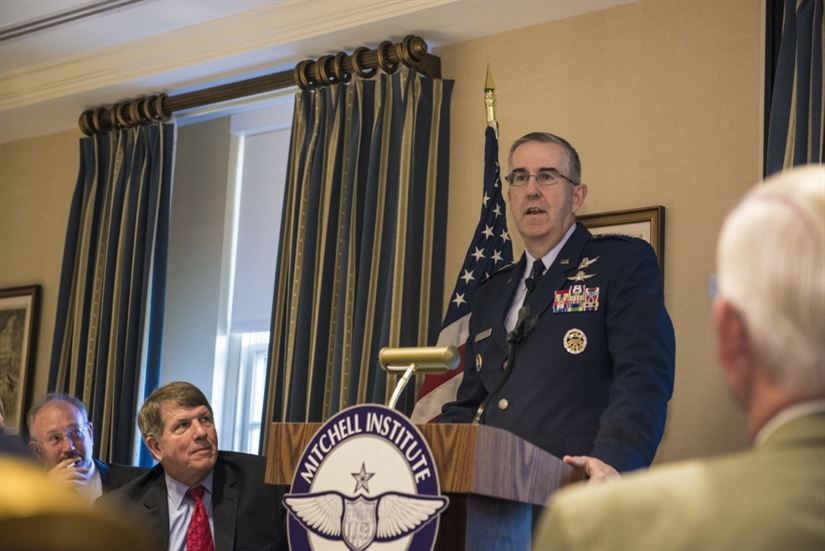U.S. STRATCOM Commander Air Force Gen. John E. Hyten spoke about the importance of space, nuclear and missile defense modernization at an event held by the Mitchell Institute in Washington D.C. on Tuesday.
General Hyten first explained the role of the U.S. Strategic Command, which is “a global warfighting command whose mission areas include nuclear, global strike, space, cyber, missile defense and electronic warfare and more,” though the General emphasized that the nuclear aspect of that list is their number one priority.
Hyten then explained that STRATCOM is the “most global” of all U.S. military commands, with a dominion that stretches from the ocean floor to 2,300 miles above the earth’s surface and a roster of nearly 184,000 men and women he claims represent the best and brightest America has to offer.
“‘Peace is our Profession’ is the motto for all 184,000 people, and those priorities apply to every element of this command,” the general said. “But nuclear is still the backbone, and it has to be our top priority.”
The general did, however, add a caveat to their peace-based motto, adding that if another nation attacked the United States, “we will respond … with overwhelming power in a way that will ruin your day and make it so you will never attack United States of America. That is the ultimate strategic deterrent.”
According to General Hyten, the advent of nuclear weapons has gone far in reducing large-scale conflict around the globe by making such massive wars so incredibly destructive, they’ve become unpalatable to world leaders. The entirety of the Vietnam war, for instance, resulted in 58,000 American casualties – which however horrific, still amounted to only “two days worth of casualties in World War II.”
That’s what our nuclear weapons have done for the world,” he added. “They don’t eliminate conflict — conflict will exist as long as humans exist. But what they have done is kept major power conflict off the world stage. They’ve kept that huge death and destruction from happening when you have major power conflicts that get out of control. It’s kept world wars from happening. That’s the primary reason that we have to have nuclear weapons.”
His statements about the importance of America’s nuclear arsenal led directly to calls for updating and modernizing America’s nuclear infrastructure. A number of reports in recent years have depicted the nuclear arm of the U.S. military as outdated and in dire need of refit, though the immense expense associated with such an undertaking has resulted in slow progress, despite other nations developing nuclear weapons, and missile defense systems, that are increasingly competitive with our own.
“The question you have to ask yourself is, how can you not afford to modernize the triad?” The General asked. The triad, commonly referred to as the nuclear triad, is a term describing the three primary delivery systems the United States employs for its nuclear weapons, effectively ensuring America can respond to any attack, no matter how large in scale. It consists of land-based intercontinental ballistic missiles (ICBMs), strategic bombers, and submarine-launched ballistic missiles (SLBMs).
The general explained what a massive undertaking it would be for a foreign enemy to target America’s arsenal of land based nukes.
That creates a huge targeting problem for our adversaries, because 400 separate ICBMs have to be targeted with multiple weapons at a time in the middle of the United States to defeat that threat,” Hyten explained. “And even if an adversary managed to do that, the triad’s most survivable element is the submarine force that is on alert every minute of every day,” he added. “And the most responsive element is the bomber force, which can be employed and called back. It gives the United States the flexibility to deploy capabilities and recall them if needed,” the general explained.
Already have an account? Sign In
Two ways to continue to read this article.
Subscribe
$1.99
every 4 weeks
- Unlimited access to all articles
- Support independent journalism
- Ad-free reading experience
Subscribe Now
Recurring Monthly. Cancel Anytime.
“But if you look at all those capabilities together,” he said, “if we put all the modernization programs on the table, it adds up to a whole lot of money.”
The concern about updating America’s nuclear arsenal is not a new one. Former Secretary of Defense Ash Carter relayed his concerns about America’s nukes simply aging out of service without a much-needed influx of cash during the 2016 Presidential Election cycle.
The fact is, most of our nuclear weapon delivery systems have already been extended decades beyond their original expected service lives. So it’s not a choice between replacing these platforms or keeping them – it’s really a choice between replacing them or losing them,” Carter said last September.
Various government and media bodies have estimated the overall cost of updating America’s nuclear triad as anywhere from $200 billion to over a trillion dollars over the span of the next thirty years, which Hyten admits, seems daunting, but shouldn’t be.
“Overall, it’s a little over six percent of our defense budget… to somehow make sure that the world knows the nation is ready and you cannot attack the United States. We have to do that,” Hyten said.
Image courtesy of the Department of Defense










COMMENTS